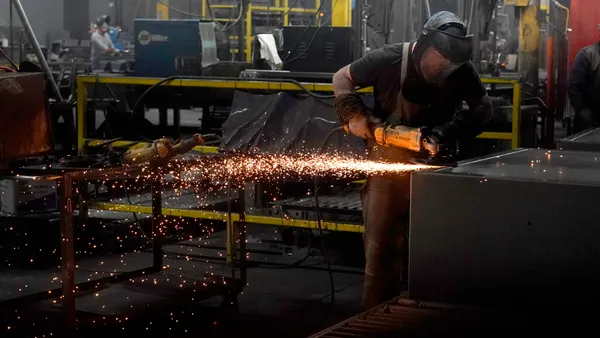Dive Brief:
- Recently unemployed individuals said they struggle to understand or articulate the skills which will benefit them most in today's job market, a May 28 survey by LiveCareer revealed. Fifty-eight percent said they are not confident they can find new jobs where their skills would apply.
- The survey found that 57% of those recently unemployed are unable to identify their transferable skills and 58% are unsure how to communicate transferable skills on their resume. The LiveCareer statement concluded that this lack of understanding "threatens to make the stay on the unemployment rolls much longer for millions of job seekers who sorely need work."
- Additionally, 56% are job hunting in a similar industry even though it may be cutting back employment. This makes sense given that 34% of respondents could not come up with examples of how their skills would apply to another job.
Dive Insight:
The gap between labor supply and demand was a problem for business leaders before the pandemic, and while the employment market has shifted with unexpected speed, finding employees with the right skills remains a key concern.
Many employers place the onus on workers to gain the skills needed to succeed in the modern workplace, but those needs are evolving so rapidly that employers are involving themselves in the upskilling process. Many business leaders believe it will be far too complex and costly to be shuffling employees in and out if their skills become obsolete so quickly.
"Getting people back to work is not going to be the issue," Scott Cawood, president and CEO of WorldatWork, wrote in a recent opinion. "Getting work back to the people will be. And, constant development will be essential to building a sustainable workplace that now only operates in a continuous cycle of change."
Over the past decade, businesses have been investing more in technology than in people, as Deloitte's recent human capital trends research found. The pandemic-driven workforce reductions may only accelerate corporate adoption of the technology and artificial intelligence tools that replace jobs.
Not all reskilling needs to be in technology, as plenty of adjacent or hybrid roles will still require non-technical workers.
"If we take collective action to help develop the right blend of technical and soft skills, people will augment rather than compete with technology and employers will be able to find and nurture the talent they need for the open jobs," Becky Frankiewicz, President of ManpowerGroup North America, told HR Dive in a previous interview.
The employment situation is not entirely dim. While some unemployed workers are having trouble finding jobs, a recent survey found that a third of workers who lost jobs, income or hours during the pandemic have started a new job. Ultimately, the pandemic will continue to shake up the labor market; employers that help their workers keep up may be better positioned for future success.











